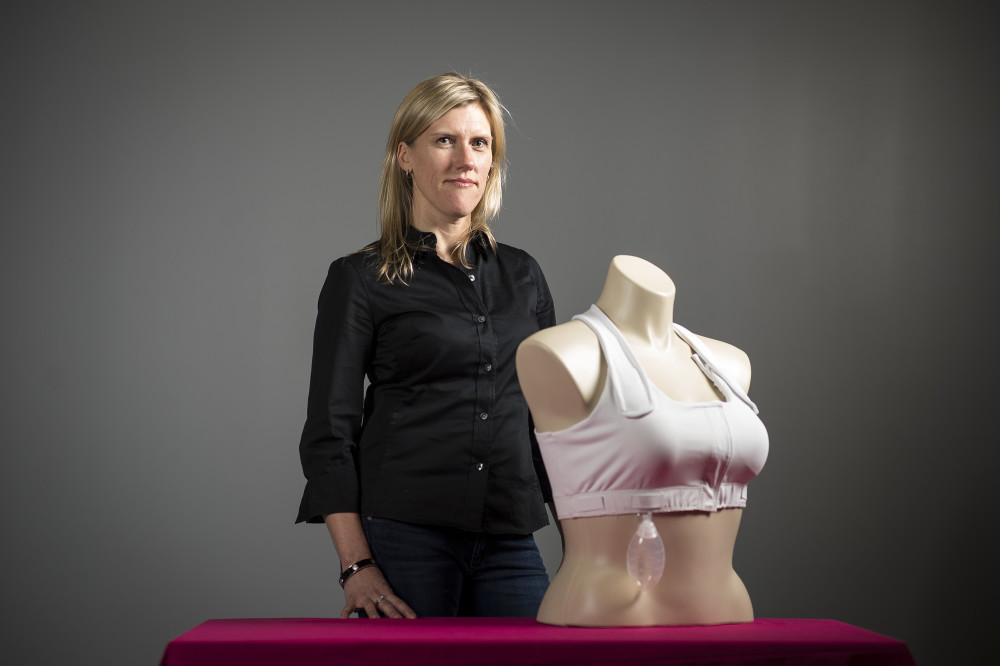By Neal St. Anthony
Star Tribune (Minneapolis).
WWR Article Summary (Tl;dr) Profile of one of the many determined women in business devoted to making life better for survivors battling breast cancer.
MINNEAPOLIS
Small-business owner Jen Swendseid started with passion and purpose.
Her business, Heart & Core, was inspired by a 2007 shopping trip for a sports bra for Swendseid’s late mother. Bonnie Severson was larger chested and also had sensitivity issues due to a battle with breast cancer.
Swendseid and her sister in 2009 launched a business to design and manufacture a sports bra that would provide high-impact support without uncomfortable underwire. They designed the “Bonita” bra and later the “Elisabeth” bra.
Swendseid also learned that commercial success takes more than passion.
“We were sure motivated,” said CEO Swendseid. “I still feel sometimes like we’re still in a startup mode, seven years later. At least I’m making fewer mistakes. And we’re surrounded by good people and we’re going in the right direction.”
It’s been a challenging journey, including a diversification move into military contracts at the suggestion of a banker that ended up saving the company. And refocusing their high-end bras from the crowded sports-apparel market to the medical-product market.
The business has consumed about $130,000 invested by Swendseid, her sister, Lara Severson, and her dad, a retiree who lives in Des Moines, Iowa.
Swendseid, 41, the mother of two children, also credits her husband, Travis Swendseid, with patience and support. His salary and benefits have covered the family and enabled Jen to continue her quest for what could be a cash-flowing operation this year.
Swendseid, who also works several hours a week as a massage therapist, has paid herself nothing-to-$20,000 annually for building Heart & Core to several hundred thousand dollars in sales, but no profit engine.
“Our financial planner doesn’t always love me,” Swendseid said. “My husband supports me … although there have been moments, such as when I had a $40,000 order in our garage. He didn’t want to see one more bra. Getting a storage rental place was a lot cheaper than marriage counseling.”
This has not been a get-rich-quick scheme, but Swendseid finally believes she’s on track.
Swendseid this year expects military sales of female underwear and sports apparel approaching $800,000. And she expects up to $100,000 in $70 bras sold through medical clinics and specialty retailers to women recovering from breast, heart or lung surgery.
“I think we can grow the post-surgical line to $2 million in sales over the next five years,” Swendseid said. “And, potentially, a bigger company could buy us. There may come a point where I’ve done what I’m going to do.”
Mark Cooper, a business consultant at MEDA, a small business-assistance nonprofit, helped Swendseid in 2010 secure the first of several Army contracts for female undergarments that has enabled her to more slowly develop post-surgery bra business.
“She’s made it over the hump,” Cooper said. “She has kept reinventing her (business) to keep financing her dream. She is headier, more strategic and more forceful than when she first came in here.
“She came in here telling me … that she wanted to bid a contract for sports bras, and I found a large bid out by the Defense Logistics Agency, which does the military buying. I called Jen and said, ‘I’ll be danged.’ She bid and got it. She already knew how to design and manufacture a higher-end bra. That military contract helped her develop her higher-end (medical) product.”
Swendseid is a humble entrepreneur, quick to dwell on mistakes, and long on praise for Cooper and patient bankers at Drake Bank in St. Paul who provided the lines of credit she needed to finance the business. She and her husband have tapped retirement accounts and collateralized credit with their house.
She was a semifinalist in last fall’s Minnesota Cup entrepreneur competition and recognized by WomenVenture, which gave Swendseid her first credit, a $10,000 microloan.
Swendseid can now laugh about her first try at manufacturing, through a U.S. sourcing agent, with a Chinese manufacturer. The original idea was bras, T-shirts and capris for the ultracompetitive fitness-apparel market. They had to order a lot. And it didn’t sell. That resulted in the apparel-packed garage.
“What a disaster,” Swendseid said of the initial foray. “We were naive.”
She later struck a deal with Los Angeles-based apparel manufacturer Sawasawa in 2011. That has worked well for both the military and medical-line products. A consultant at WomenVenture helped Swendseid in 2012 refocus the Bonita and Elisabeth bras on medical facilities, medical-apparel retailers and the Heart & Core website. The bras feature special support, including drain-management systems for post-surgery patients.
It helps women “feel more normal” and “properly supported” and get back in action as mothers and otherwise, Swendseid said.
The business also has drawn Swendseid closer to her dad, Roger Severson, a retired small-business man who has helped with marketing and finance. Her sister, Lara, who works in California, does part-time marketing and website work for Heart & Core.
“My mom knew we were working on this,” Swendseid said of Bonita Severson, who died in 2013. “She liked what we were trying to do for women. She was a social worker. She liked to help. She would be pleased to see how we’ve persevered.”














































































































































































































































































































































































